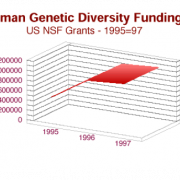Aussies Pirate
Submitted by ETC Staff on
The agricultural departments of at least four Australian state governments, as well as a bevy of other national public and private research institutes, are routinely pirating the indigenous knowledge of farming communities and international research institutes around the world, according to the Canada-based Rural Advancement Foundation International (RAFI) - a rural advocacy organization with twenty years experience in the field. Accusing the Aussie agencies of making cowboy claims' on farmer-bred plant varieties from Brazil to India, RAFI's Executive Director, Pat Roy Mooney, says that several dozen plant 'patent' claims listed by Canberra's Plant Breeder's Rights Office are 'a clear rip-off of the genius of others. In most of these cases, the Australians appear to have done nothing more than select and multiply somebody else's seed and then slap a PBR (plant patent) monopoly on them,' Mooney insists.
International Research Centre (ICARDA) Breaks Trust
Submitted by ETC Staff on
The Syrian-based International Centre for Agricultural Research in Dry Areas (ICARDA) has fundamentally misinterpreted its authority" with respect to crop germplasm it holds in trust on behalf of the United Nations, according to the Rural Advancement Foundation International (RAFI). In a letter sent to RAFI's Executive Director, Pat Mooney, on January 26th, ICARDA's Director-General, Prof. Dr Adel El-Beltagy, admitted that the Centre had willingly allowed a number of Australian institutes to apply for Plant Breeder's Rights (a form of plant patent) on varieties the Centre holds under a trusteeship agreement with the UN Food and Agriculture Organization (FAO) in Rome.
Australians Abandon 2 Plant Patent "Claims"
Submitted by ETC Staff on
Australian crop development agencies have been forced to abandon their claims on two chickpea varieties they admit were obtained from an international public research institute based in India (see RAFI's release of 6 January). In a blunt message sent January 8th, the institute, the International Crops Research Institute for the Semi-Arid Tropics (ICRISAT) - acting on information from RAFI - demanded that the claims for Australian Plant Breeders' Rights (a patent-like intellectual property regime for crop varieties) be dropped. On January 16th, the two Australian institutes - Agriculture WA and CLIMA - said that the claims had been abandoned.
Recent Australian Claims to Indian and Iranian Chickpeas Countered by NGOs and ICRISAT
Submitted by ETC Staff on
The Australian seed industry has applied for plant breeder's rights (PBR) on two chickpea varieties taken from ICRISAT (International Crops Research Institute for the Semi-Arid Tropics) - an internationally-funded public research centre based in Hyderabad, India. If granted, the Australians will give themselves a 20 year monopoly on the Asian chickpeas, which they propose to market in South Asia and the Middle East. Neither variety, however, is new to farmers. In fact, both are ICRISAT accessions originating in farmer's fields in Iran and India. It's blatant biopiracy," explains Farhad Mazhar of Bangladeshi organization UBINIG and the South Asian Network on Food, Ecology, and Culture, "Australia is privatizing seeds that belong to our farmers, and they plan to sell them back to us with their own self-authorized plant monopoly."
US Funding of Human Biodiversity Collections Carries on Despite Contrary Scientific Advice
Submitted by ETC Staff on
NSF Sidesteps Own Report to Fund Controversial Project to Collect the Blood of Indigenous Peoples Around the World. International Controls Needed.

